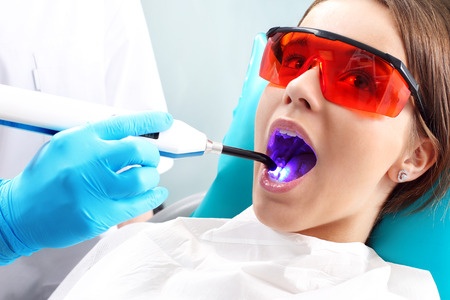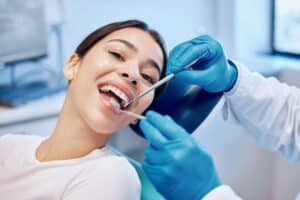Brushing and flossing are a major part of cavity prevention, but cleaning the surfaces of your teeth is only part of the plan. Laser dentistry is an incredible advancement in the field that allows Dr. Ania to use diode laser energy to deep clean and remove gum tissue that has been diseased by bacteria. Laser dentistry is just one way we use technology to improve results for our patients, and to make treatments safer and more comfortable.

How Lasers Work
Soft tissue lasers (Light Amplification by Stimulated Emission of Radiation) use pulsed beams of concentrated energy that help Dr. Ania accomplish her gum enhancement goals. The laser performs two primary functions: laser decontamination (cleaning) and laser therapy (vaporization of diseased tissue). The first mode is used even on healthy patients to reduce bacteria, while laser therapy is most often used on patients with periodontal disease.
Remember that even the healthiest patients have millions of bacteria present at any given time.
Use of the incredible soft tissue laser results in dramatic bacteria reduction previously not possible with handheld instruments. Lasers also helps keep bacteria from settling, a benefit called “delayed recolonization.” This means that after bacteria removal, your gums have more of a chance to heal because the tissue is not as vulnerable to new bacteria settling in.
Uses of the Soft Tissue Laser

Dr. Ania often applies the use of lasers in her dentistry practice to offer a speedy and more pain-free treatment for certain procedures, and for treatment that may not have been possible in the past. Dr. Ania can treat unsightly cold sores with low intensity dental lasers that reduce irritation and minimize healing time. These lasers are also used to detect and treat cavities, enhance a smile by reshaping the patients gums, eliminate benign tumors, whiten teeth and more.
Dr. Ania uses lasers in her practice for:
- Deep Cleaning of Gingival Pockets (Laser Decontamination): Lasers effectively remove bacteria and infected tissue from deep within the gingival pockets, promoting better gum health and aiding in the treatment of periodontitis.
- Diseased Tissue Removal (Laser-Assisted Periodontal Therapy): This technique allows for the selective removal of diseased tissue without harming the surrounding healthy tissue, improving healing and reducing the risk of infection.
- Sterilization of Root Canals: Lasers offer a high level of sterilization during root canal treatments by eliminating bacteria more thoroughly compared to conventional methods, which can enhance the success rates of the procedures.
- Gum Recontouring: Lasers are used to reshape the gums to improve the aesthetic appearance of a smile. This procedure can correct an uneven gum line or reduce a “gummy” smile.
- Crown Lengthening: Like gum recontouring, this procedure uses lasers to reshape the gum and bone level to expose more of the tooth, often necessary for proper dental restoration.
- Dental Implant Exposure: Lasers can uncover dental implants that have been covered by excess gum tissue, preparing them for final restoration without the need for scalpel incisions.
- Cold Sore Treatment: Lasers can reduce the pain and duration of cold sores by promoting faster healing and reducing viral loads at the site of the outbreak.
- Laser Tooth Whitening: This is a popular cosmetic procedure where lasers accelerate the bleaching process applied to teeth, resulting in faster and more effective whitening.
- Cavity Detection and Treatment: Lasers detect and remove cavities with precision, preserving more of the healthy tooth while minimizing discomfort.
- Gum Disease Treatment: Targeted laser treatment removes inflamed gum tissues and aids in the management of periodontal diseases.
- Biopsy or Lesion Removal: Used for taking tissue biopsies and removing mouth lesions with minimal discomfort.
- Frenectomy: Ideal for correcting lip and tongue ties in infants and adults with minimal bleeding and no stitches required.
Who Is a Good Candidate for Laser Dentistry?
The ideal candidates for laser dental procedures are people who are in good health and looking to improve the appearance of their smile, gums, crowns, and teeth. Laser dentistry may also target deep cleaning, so it’s important that candidates do not have gum disease or active infections.
Laser treatment will not work on people who have deep cavities in their teeth or those who have fillings. Because there are so many factors to consider for eligibility for laser dentistry, scheduling a consultation with Dr. Ania Mohelicki is the first step toward your new and improved smile.
Dr. Mohelicki draws from her expertise of over 20 years in practice to provide both high-quality dental care and in-depth consultations to consider each patient’s dental history, needs, and goals. Consulting with her will help determine if you are a candidate for laser dentistry.
Click here to schedule your first consultation.
Are There Any Side Effects of Laser Dentistry?
Although laser dentistry is a safe method of achieving a brighter, more radiant smile, there are a few side effects that patients may experience following their treatment. This can include the following:
- Burning or itching sensation after treatment
- Inflammation or swelling of the gums
- Soreness or tenderness from open-mouth wounds
- Increased tooth sensitivity
- Soreness in the jaw
After two to seven days, most of these side effects will subside. By following the proper aftercare guidelines as recommended by Dr. Mohelicki during your recovery, many of these side effects will disappear on their own without complication.
Do I Need to Avoid Certain Foods After My Laser Dentistry Treatment?
Because we use our mouths daily, it is easy for the results from laser dentistry to become eroded or damaged from everyday eating and drinking. Without the proper care, a patient’s eating and drinking habits can quickly undo the results of your laser dental treatment. While each patient’s recovery process following their procedure will vary, in general, most patients are encouraged to avoid the following foods and drinks to prevent damaging their laser dental treatment results:
- Hard foods such as raw apples or hard candies
- Crunchy food such as peanut brittle or chips
- Chewy foods such as gum or caramel
- Alcohol and spicy foods for the first 48 hours after treatment
- Limit caffeine
Is Laser Dentistry Covered by Insurance?
Insurance coverage for laser dentistry varies significantly by provider and policy. While some insurers recognize the benefits of laser treatments and offer coverage comparable to traditional procedures, others may not cover them at all. This is why we encourage our patients to consult with their insurance providers to understand what procedures are covered and if there are any additional costs. Our team can help determine what benefits you are entitled to so that you minimize any out-of-pocket expenses.
Is Laser Dentistry Suitable for Children?
Laser dentistry is highly suitable for children as it often eliminates the fear associated with dental drills and needles. Treatments with dental lasers tend to be quieter, quicker, and less invasive, which is ideal for keeping children calm and comfortable during procedures. Common pediatric uses include cavity treatments, frenectomies, and soft tissue surgeries, all performed with minimal discomfort and recovery time.
Discover the Benefits of Laser Dentistry in Boulder, CO
 If you’re seeking a more comfortable and precise dental experience, laser dentistry offers an innovative approach to treating a wide range of oral health concerns. At the Boulder office of Dr. Ania, you can receive advanced laser dental care in a modern, patient-centered environment. This minimally invasive technology is changing how common dental procedures are performed—and how patients like you experience them.
If you’re seeking a more comfortable and precise dental experience, laser dentistry offers an innovative approach to treating a wide range of oral health concerns. At the Boulder office of Dr. Ania, you can receive advanced laser dental care in a modern, patient-centered environment. This minimally invasive technology is changing how common dental procedures are performed—and how patients like you experience them.
How Laser Dentistry Improves Patient Comfort and Recovery
Laser dentistry eliminates the need for traditional drills or scalpels in many procedures. The technology uses concentrated light energy to perform precise treatments on both hard and soft tissues. Because lasers can target specific areas without impacting surrounding tissues, you’ll experience less bleeding, minimal swelling, and a significantly faster healing time.
Benefits of Laser Treatment for Periodontal Disease
If you’re dealing with gum disease, laser dentistry can help by targeting and removing inflamed gum tissue without harming healthy tissue. This method promotes faster tissue regeneration, reduces the need for sutures, and minimizes discomfort during and after the procedure. It’s an excellent option for managing chronic gum conditions with less downtime and fewer complications.
Laser Dentistry for Cold Sores: How It Works and What to Expect
Laser treatment for cold sores can speed up healing and even prevent future outbreaks. When applied at the onset of a sore, the laser reduces the viral load and inflammation. Many patients report immediate relief from discomfort, and regular treatment can reduce the frequency and severity of flare-ups.
Before and After: Gum Contouring and Crown Lengthening Results
Laser dentistry is ideal for cosmetic procedures like gum contouring and crown lengthening. Whether you want to improve a “gummy” smile or prepare a tooth for restoration, the laser allows for a highly accurate and aesthetically pleasing result. The reduced trauma to tissues also means less discomfort and a quicker return to your normal routine.
Why Choose Dr. Ania for Laser Dentistry in Boulder?
You deserve a provider who combines skill, technology, and compassion. Dr. Ania is an experienced cosmetic and general dentist with a commitment to integrating advanced techniques like laser dentistry into her practice. Her goal is to ensure you receive the highest quality care with the least amount of stress and discomfort. At her Boulder office, you’ll find a supportive team, personalized treatment plans, and cutting-edge equipment designed to put your oral health first.
FAQs
What dental issues can laser dentistry treat effectively?
Laser dentistry can address cavities, gum disease, cold sores, gummy smiles, tooth sensitivity, and soft tissue lesions, among others.
How does laser dentistry compare to traditional drills?
Laser tools offer more precision, reduced pain, and faster recovery. They also eliminate the vibration and noise associated with drills, creating a calmer experience.
Is laser treatment painful or require anesthesia?
Most patients experience little to no pain during laser procedures. Many treatments can be done without anesthesia, depending on your sensitivity.
Can laser dentistry help with cosmetic smile enhancement?
Yes, procedures like gum contouring and crown lengthening benefit greatly from laser precision, leading to a more balanced and attractive smile.
What is the downtime or recovery period after a laser dental procedure?
Recovery is generally shorter than with traditional methods. Most patients return to normal activities within a day, with minimal discomfort.
How can I prepare for my first laser dental appointment?
Eat a light meal, brush and floss beforehand, and bring a list of questions or concerns. Your provider will guide you through every step of the process.
Schedule Your Laser Dentistry Consultation in Boulder Today!
Please contact Dr. Ania today to schedule your semi-annual teeth cleaning and see for yourself how dental lasers make a difference. Our practice serves Boulder, CO and the surrounding areas. To find out if you are a candidate for our laser dentistry service, call (303) 443-0998 today.
